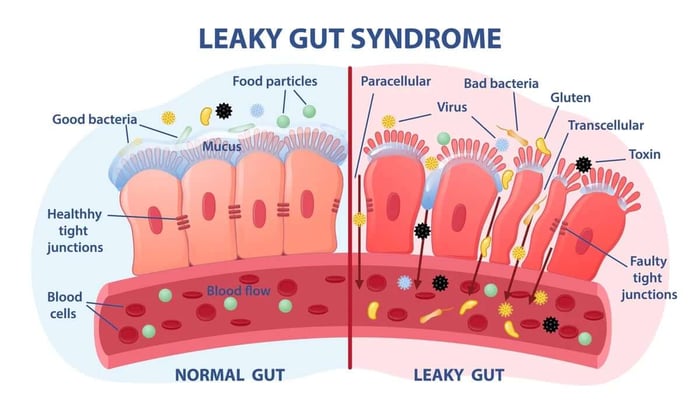Table of Contents
As spring settles in and we shift into longer days, fresh foods, and more time outdoors, it’s a good time to check in on how our gut is holding up.
This time of year brings subtle shifts that can impact digestion—especially for people dealing with leaky gut symptoms.
What’s Going On With Leaky Gut?

The gut lining is meant to act like a fine strainer—letting nutrients through while keeping irritants and toxins out.
When that lining starts to break down, it can become more like a leaky sieve, allowing larger particles to slip into the bloodstream. That’s when you start to feel the ripple effects—bloating, sensitivities, skin issues, fatigue, and more.
Why Spring Makes a Difference
Changing seasons can throw the gut a few curveballs:
- Diet Changes – More raw produce and fiber-rich foods can surprise your system if it’s not ready.
- Increased Allergens – More pollen and environmental allergens may aggravate gut-related immune responses.
- Sunlight + Vitamin D – A good thing—but if your levels shift quickly, it can play a role in how your gut lining functions.
What to Watch For
Leaky gut doesn’t always show up with bold warning signs. Sometimes it’s a collection of smaller symptoms that build up over time. Here are a few common signals your gut barrier might be under stress:
- Bloating and Gas – If you feel puffed up or uncomfortable after meals (even healthy ones), that could mean food isn’t being broken down properly or is irritating your intestinal lining.*†
- Digestive Ups and Downs – From loose stools to constipation, irregularity can be a sign that your gut lining is inflamed or not absorbing nutrients efficiently.*†
- Brain Fog or Low Energy – When your gut is inflamed, it can trigger immune responses and release stress signals that affect focus, memory, and mood.*†
- New or Worsening Food Sensitivities – If foods you used to tolerate now cause discomfort, it could be your gut lining letting in particles that trigger your immune system.*†
- Skin Flare-Ups – Eczema, acne, or rashes are often linked to gut issues. If your gut is inflamed, your skin may be the first place that shows it.*†
- Joint Aches or Headaches – Systemic inflammation can start in the gut. A leaky gut may be behind aches and pains that don’t seem tied to activity or stress.*†
If you're checking more than a couple of these boxes, it’s worth paying closer attention—and supporting your gut with the right nutrients can make a noticeable difference.
How to Support Your Gut—From the Inside
This isn’t about guesswork. There are specific nutrients and ingredients shown to soothe, rebuild, and strengthen the gut lining:
- DGL Licorice Root Extract – Helps calm and protect the gut lining from irritants.*†
- Quercetin Phytosome – A powerful flavonoid that supports intestinal integrity and regulates inflammatory responses.*†
- Slippery Elm Bark & Marshmallow Root – These mucilaginous herbs coat and protect the lining of the GI tract.*†
- Aloe Vera Extract – Known for its cooling, soothing properties to support healing in the digestive tract.*†
From Emerald Labs Digestive Health:
- DPP-IV Enzyme (250 units) – A gluten-targeted digestive enzyme that helps break down problem proteins before they become an issue—especially useful for those with gluten sensitivities.*†
Now’s a smart time to give your gut the support it’s asking for. Whether you're noticing changes in digestion or just want to stay ahead of seasonal stressors, our Digest and Detox formulas are built to help.
For a limited time, you can get 15% off both Leaky Gut and Digestive Health supplements—just use code DETOX15 at checkout.





